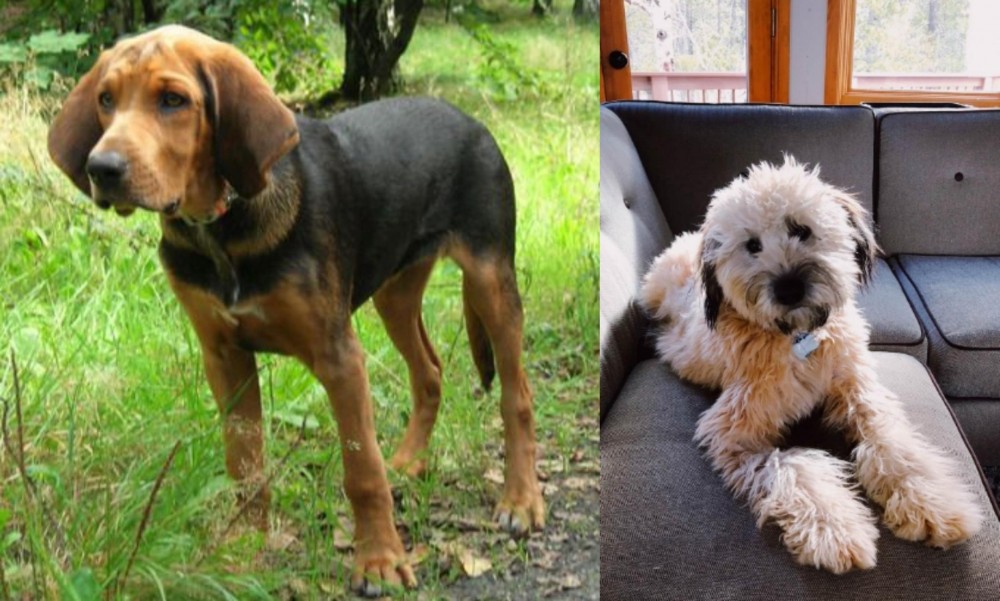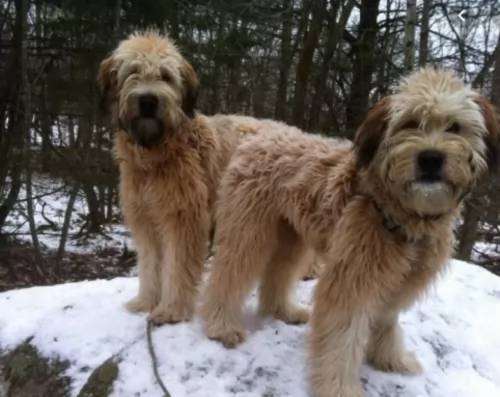 Petzlover
Petzlover Polish Hound is originated from Poland but Whoodles is originated from United States. Polish Hound may grow 15 cm / 6 inches higher than Whoodles. Polish Hound may weigh 12 kg / 27 pounds more than Whoodles. Both Polish Hound and Whoodles has almost same life span. Polish Hound may have more litter size than Whoodles. Both Polish Hound and Whoodles requires Moderate Maintenance.
Polish Hound is originated from Poland but Whoodles is originated from United States. Polish Hound may grow 15 cm / 6 inches higher than Whoodles. Polish Hound may weigh 12 kg / 27 pounds more than Whoodles. Both Polish Hound and Whoodles has almost same life span. Polish Hound may have more litter size than Whoodles. Both Polish Hound and Whoodles requires Moderate Maintenance.
 It is thought that Polish Hounds descended from the Kostroma Hound. Other experts believe that the dogs were developed through crossbreeding of Bloodhounds with local Polish hounds.
It is thought that Polish Hounds descended from the Kostroma Hound. Other experts believe that the dogs were developed through crossbreeding of Bloodhounds with local Polish hounds.
The idea was to get a more lighter-boned, more athletic Bloodhound type of dog. In fact, this new standard was adopted in 1983 as the guide for the ideal Polish Hound.
The World Wars caused the numbers of these dogs to be drastically reduced, and attempts were made to revive the breed. The dog is rare outside his native country.
 Known also as the Wheatenpoo or the Wheatendoodle, the Whoodle is a teddy-bear kind of mixed-breed dog, being a cross between Poodles and the soft-coated Wheaten Terrier.
Known also as the Wheatenpoo or the Wheatendoodle, the Whoodle is a teddy-bear kind of mixed-breed dog, being a cross between Poodles and the soft-coated Wheaten Terrier.
He came about in the mid-1900s so he is still quite a new breed. Like with most hybrid breeds, the Whoodle doesn’t have a well-documented history.
Because most hybrids hail from the USA, one can assume that the Whoodle comes from there as well.
 The Polish Hound is a nice, big, solid looking dog. He stands at between 55–65 cm in height and weighs between 20 to 32kg, both male and female. If you were to try and think of him, you could think of a Labrador/Beagle/Bloodhound mix.
The Polish Hound is a nice, big, solid looking dog. He stands at between 55–65 cm in height and weighs between 20 to 32kg, both male and female. If you were to try and think of him, you could think of a Labrador/Beagle/Bloodhound mix.
He is a medium to large sized dog. The coat is short to medium in length and is thick and hard with a soft, dense undercoat. The color of the coat is brown and tan and black and tan. The dog’s tail is set low and is thick and long.
This dog is a wonderful dog known to be clever and eager to please. He also has other attractive characteristics such as being energetic, gentle and he has an urge to protect his human family.
He is also loved because he is reliable and gentle around children who know how to treat dogs with respect. Some people who have owed this dog say that there is just one small fault – the dog’s bark – it is deep and mellow – and its why he isn’t suited to life in the city.
He is a rural dog, loving wide open spaces. It is why the dog will be an excellent pet if he is trained and socialized, becoming obedient and well balanced.
 The Whoodle is a medium-sized dog that stands at between 30 and 50cm in height and weighs in the region of 9 to 20kg.
The Whoodle is a medium-sized dog that stands at between 30 and 50cm in height and weighs in the region of 9 to 20kg.
He has a silky, medium-length coat that can be fairly straight or wavy and which is available in a range of colors – black, brown, grey, cream and red.
He isn’t a heavy shedder, but their hair can grow fairly long so he will have to be groomed one way or the other. Many people choose to have him trimmed at the doggy salon. With the Poodle being in the mix, it is thought that the Whoodle coat is hypoallergenic, sought after by dog owners who suffer from allergies.
Just because of the dog breeds your Whoodle dog comes from, you can know that you’re going to have a playful, happy, friendly, outgoing, social pet who will have no doubt inherited a lot of good qualities from both parent breeds.
He will happily settle down with you in the city or the countryside. He absolutely loves human company and isn’t the kind of dog to be put outside for hours separated from his humans.
If there are children in the home, they’ll discover that this little dog is always up for a game. He gets on well with children and other pets. Early training and socialization will be imperative for the Whoodle as he is a strong-willed dog, inclined to be stubborn and you want to make sure he is obedient.
 As a family pet, the Polish Hound just loves his human family, particularly when they are outdoor, active types. Your Polish Hound just loves spending time with his human family.
As a family pet, the Polish Hound just loves his human family, particularly when they are outdoor, active types. Your Polish Hound just loves spending time with his human family.
This is a wonderful dog as a family pet. More so when he has been trained and socialized. In exchange for the the wonderful companionship this dog offers you, you owe it to him to keep him happy and content.
 The Whoodle is a hybrid dog – a mix between the soft-coated wheaten terrier and the poodle.
The Whoodle is a hybrid dog – a mix between the soft-coated wheaten terrier and the poodle.
They make splendid pets and companions and are cheerful and intelligent, wanting to be constantly by your side.
Because both of the parents are working dog breeds, he is an active dog too, loving to take part in all the activities his family is busy with.
When you bring this little teddy bear of a dog into your home, you’re going to have years of benefiting from a true canine companion.
 The Polish Hound has a reputation for good health. That doesn’t mean you can just leave your pet. Good preventative healthcare is still vital if you want to prevent your pet being attacked by fleas, ticks, worms and mosquitoes.
The Polish Hound has a reputation for good health. That doesn’t mean you can just leave your pet. Good preventative healthcare is still vital if you want to prevent your pet being attacked by fleas, ticks, worms and mosquitoes.
You need to be careful with the Polish Hound because it's a deep chested dog, and these kinds of dogs are more prone to bloat. This is a deadly disease when the stomach twists and gas can’t escape. Untreated, bloat can be a killer. Take immediate action when you see your dog with a swollen stomach, restlessness and drooling.
 The Whoodle is considered to be a healthy little dog but they can suffer from some of the many common dog illnesses there are. It’s important to feed your dog well and to exercise him to ensure his good health. Some of the common health problems he could suffer with -
The Whoodle is considered to be a healthy little dog but they can suffer from some of the many common dog illnesses there are. It’s important to feed your dog well and to exercise him to ensure his good health. Some of the common health problems he could suffer with -
It is important to ensure your Whoodle has his vaccines to prevent some of the deadly canine diseases there are.
Also, it is a good idea to have your pet neutered or spayed to prevent an unwanted litter. Spaying and neutering have health benefits for your pet, so it is a good idea to have this done for them.
 As a working dog, the Polish Hound is used to being busy and will be relying on you for a good dose of exercise. He loves the chance of a walk or a run and will be happy to run alongside you while you cycle or jog. Don’t forget ball games too.
As a working dog, the Polish Hound is used to being busy and will be relying on you for a good dose of exercise. He loves the chance of a walk or a run and will be happy to run alongside you while you cycle or jog. Don’t forget ball games too.
The thick coat of the dog will need to be brushed twice a week to remove all that loose hairs. He is a moderate shedder so the coat becomes dull if not regularly brushed.
During the brushing session, check your dog over for fleas and ticks, and any odd lumps that weren’t there before. Trim your pets nails if they don’t wear down naturally. This is a floppy eared breed, so you will need to check the inside of his ears for dirt, wax and bacteria.
Pay close attention to your dog’s teeth.Bad teeth can cause a lot of pain but also be very detrimental to your dog’s health.
Just like humans, dogs rely on quality food for good health and longevity. There are many good commercially manufactured dog foods, but avoid the ones with low quality ingredients as these can make your dog ill.
Check the ingredients-list carefully so that you can be sure your pet is getting the right balances of vitamins and minerals. Home-made food is also important as it is nutritious and tasty. You can add it into the dry kibble as a treat sometimes. The simpler the better as dogs don’t like spicy, exotic foods.
Boiled chicken, brown rice or pasta, sweet potatoes, spinach and carrot can be chopped up and given to your pet. Also try and include some raw meat as this is beneficial for health. Fresh, cool water must be made constantly available.
 Apart from your Whoodle requiring regular nail trimming, you will want to brush him twice a week to keep their coat free from matting. Some Whoodle owners prefer to have their pets professionally groomed.
Apart from your Whoodle requiring regular nail trimming, you will want to brush him twice a week to keep their coat free from matting. Some Whoodle owners prefer to have their pets professionally groomed.
Check inside his mouth while grooming to ensure there are no bad teeth. This could cause your pet a lot of pain and he has no way of telling you this.
As a medium-sized dog, you want to feed your pet a commercially manufactured dog food that has been formulated for a medium-sized dog and one with lots of energy.
Their dietary needs change from puppyhood to adulthood and where the puppy received 4 bowls of food a day, the adult Whoodle will require 2. Always buy the best quality food you can as the choice of food you provide has a huge impact on his health.
Some home-made food is always a good idea too but it needs to be simple and plain, without any exotic spices. Boiled chicken, rice and vegetables is always a splendid choice and it can be added to the dry kibble as a supplement.